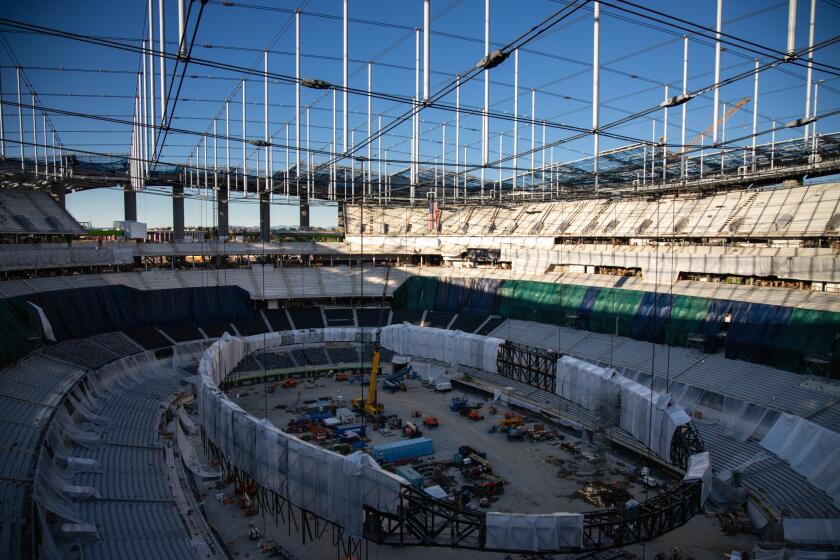MSG lawsuit argues state’s fast-tracking of Clippers arena is unconstitutional
The legal brawl over the arena the Clippers plan to build in Inglewood intensified Friday as Madison Square Garden Co. sued Gov. Gavin Newsom and the state’s Joint Legislative Budget Committee over legislation that fast-tracks the project.
The lawsuit filed in Los Angeles County Superior Court alleges that Assembly Bill 987, passed in late 2018 to shield the billion-dollar development from extended environmental litigation if it met several requirements, violates the state constitution.
“It is invalid ‘special’ legislation under the clearly established California Supreme Court precedent; it grants the Legislature power reserved for the executive and judicial branches; and it curtails the judiciary’s constitutional jurisdiction to review executive action in favor of review by a single legislative committee, violating the Constitution’s separation of powers,” the lawsuit said.
Newsom certified the privately financed project last month under AB 987, and the Joint Legislative Budget Committee concurred.
The decision sets a nine-month limit for lawsuits and appeals over the environmental impact to be resolved after the project moves forward. That’s a key benefit for Murphy’s Bowl LLC, the Clippers-controlled company developing the arena, because of a bitter dispute with MSG over the project that hasn’t shown signs of resolution.
The billion-dollar arena complex the Clippers want to build in Inglewood might create a “large number of significant and unavoidable transportation impacts.”
MSG owns the nearby Forum, views the proposed arena as a competitor and has contested the project at each juncture since it was announced in 2017. The company has two additional lawsuits pending in relation to the arena — dozens of key figures from the Clippers, MSG and Inglewood have been deposed — and has paid the legal fees for a community group that’s also suing.
The lead developer for the arena, Chris Meany, said in a statement that the lawsuit Friday is “the latest desperate attempt in an all-out legal onslaught” to slow the project. Meany called the litigation “meritless” and said the Clippers “remain undeterred” in their plans to open the arena in time for the 2024-25 season.
Newsom’s office didn’t respond to a request for comment.
The certification by the governor and legislative committee followed 11 months of negotiations between Murphy’s Bowl LLC and the California Air Resources Board, which found the project to be net carbon neutral. As part of the deal, Murphy’s Bowl and the air resources board agreed to a package that included a program to reduce trips to the arena by 15% and providing 1,000 electric car chargers for area residents.
The lawsuit alleges the arena will cause “substantial harm” to Inglewood through increased traffic and pollution, repeatedly notes that AB 987 “exists for the sole purpose of benefiting the Clippers” and claims the legislation “lightens the burden” for the project to meet environmental requirements.
“These are material advantages that would enable the Clippers to construct and operate their arena more quickly and inexpensively than similarly situated developers without comparable environmental benefit and oversight,” the lawsuit said.
Two companies owned by Stan Kroenke have sued an insurance firm over cleanup of arsenic-contaminated soil at development billionaire is building in Inglewood.
The lawsuit seeks a writ of mandate compelling Newsom to withdraw his certification of the project in addition to a declaration that AB 987 is unconstitutional as an “impermissible special statute.”
Last month, Inglewood released the draft environmental impact report for the project. The bulky report predicted unavoidable traffic problems on days of major events but concluded that the arena would add almost 1,000 full-time nonconstruction jobs to Inglewood and wouldn’t contribute to gentrification.
The public comment period on the report runs through Feb. 10.
More to Read
Get our high school sports newsletter
Prep Rally is devoted to the SoCal high school sports experience, bringing you scores, stories and a behind-the-scenes look at what makes prep sports so popular.
You may occasionally receive promotional content from the Los Angeles Times.









